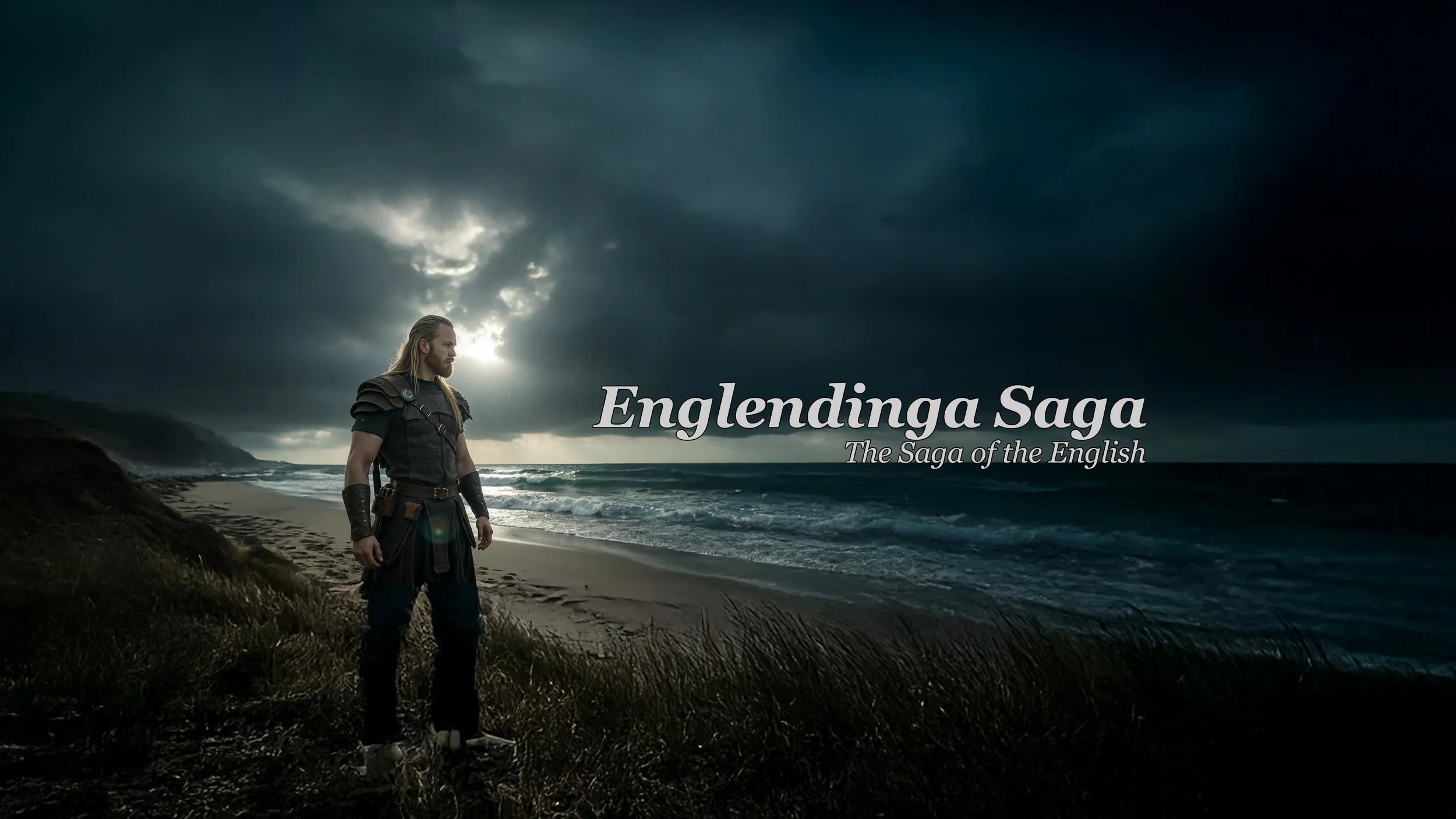
T H E W O R D H O R D E
Who knows, maybe you’ll learn something
Old Tongues. New Tales. Unearthing the raw power of Beówulf, the stark beauty of Anglo-Saxon verse, and the thunderous sagas of the Old Norse, this blog is your guide through the ancient words that shaped our world. Join us as we journey into the heart of heroic epics, explore the myths, and decipher the languages that echo through the ages.
The latest video from my Englendinga Saga YouTube channel
Ever wonder about the crazy stories behind England's past? Me too! This channel is where I'm attempting to untangle the heroes, myths, and family trees, focusing a lot on Beowulf. Warriors, monsters, good vs. evil – it's all in that Old English poem. As I dig into the poem's history and themes, we'll also be peeking at Anglo-Saxon and Old Norse culture, language, and mythology. Let's explore these ancient worlds together!
Hygd
Beowulf brings brilliant characters beyond the battles and beasts—queens commanding kingdoms with careful consideration and calculated choices. Hygd, the Geatish queen, governs with grace and genuine wisdom, wielding wealth and worldly authority with remarkable restraint and royal responsibility. Discover…..
Grendel’s Mother
Beowulf's brutal battle brings forth a bewildering truth: Grendel's Mother, a formidable figure from forgotten folklore, follows the blood-feud laws of Anglo-Saxon society with greater justice than the heroes themselves. Vengeance, violence, and virtue intertwine in this vital examination of Old English literature, revealing…..
Wealhtheow
Wealhtheow walks where warriors wake and drink, Wary of words that push the peace to the brink. The cup she carries calms the kin-strife cold, A queen of questions in a hall of gold, Before the fire makes the fortress sink.
The Bones of Beowulf
Delve into the dark depths of Beowulf's origins, a complex composition by cunning craftsmen, and discover the theories surrounding this venerable verse. This unveiling of Beowulf for Old English scholars and saga enthusiasts explores R.W. Chambers' profound insights into the debates concerning its Scandinavian
The Unsung Valour Pt 4
Dive deep into the rich tapestry of Old English poems with our exploration of Beowulf's unsung heroes. This Anglo-Saxon literature analysis goes beyond Beowulf, revealing the multifaceted bravery of Old Norse characters like Hrothgar, Wiglaf, Hygelac, and Ecgtheow. For enthusiasts of Old English poetry and Old Norse…..
The Unsung Valour Pt 3
Dive deep into the rich tapestry of Old English poems with our exploration of Beowulf's unsung heroes. This Anglo-Saxon literature analysis goes beyond Beowulf, revealing the multifaceted bravery of Old Norse characters like Hrothgar, Wiglaf, Hygelac, and Ecgtheow. For enthusiasts of Old English poetry and Old Norse…..
The Unsung Valour Pt 2
Dive deep into the rich tapestry of Old English poems with our exploration of Beowulf's unsung heroes. This Anglo-Saxon literature analysis goes beyond Beowulf, revealing the multifaceted bravery of Old Norse characters like Hrothgar, Wiglaf, Hygelac, and Ecgtheow. For enthusiasts of Old English poetry and Old Norse…..
The Unsung Valour Pt 1
Dive deep into the rich tapestry of Old English poems with our exploration of Beowulf's unsung heroes. This Anglo-Saxon literature analysis goes beyond Beowulf, revealing the multifaceted bravery of Old Norse characters like Hrothgar, Wiglaf, Hygelac, and Ecgtheow. For enthusiasts of Old English poetry and Old Norse…..
The Scorch Marks of Greed
Exploring Beowulf's beasts and ancient Anglo-Saxon tales. Wondering why the Beowulf dragon truly matters in Old English verse? Delve into the profound symbolism of the fire-drake as we unearth its historical context. This video explains how the creature represents more than just a foe, reflecting deep societal…..
When the Night Howled
Dive deep into the dread-filled Beowulf monsters explained, from the gruesome Grendel to the fearsome fiery Dragon. Understand Old English mythology and the chilling symbolism behind these powerful figures. This video explores their terrifying presence in the poem, their metaphorical weight, what they truly meant to…..
I Learned to Read the Opening of Beowulf in Old English
Dive deep into the challenging, yet rewarding, world of Old English pronunciation with this exploration of Beowulf's iconic opening lines. From surprising 'G' sounds to forgotten guttural 'H's, embark on a linguistic adventure that unveils the true phonetic richness of our ancient language. Discover how modern technology…..
Beowulf
Beowulf, the anonymous Old English epic, offers a visceral examination of early medieval warrior culture, exploring themes of loyalty, vengeance, and the harsh realities of fame through the legendary feats of its Geatish protagonist. The article delves into Beowulf's battles against Grendel, Grendel's Mother, and…..
The Northern Echo
Unlock the compelling mystery behind Beowulf, the monumental Old English poem. This article meticulously explores the Scandinavian origins theory, delving into why this Anglo-Saxon epic, featuring Geatish and Danish heroes, might be a brilliant adaptation of Old Norse sagas. Discover the linguistic clues…..
The Unveiling of Kings
Dive deep into the Beowulf poem's ancient Danish Royal Line with this insightful article, drawing on R. W. Chambers' meticulous Old English scholarship. Discover the foundational myths of figures like Scef, Scyld, and Beow, and explore the intricate Genealogy that underpins Hrothgar's reign. This piece for Further Education…..














